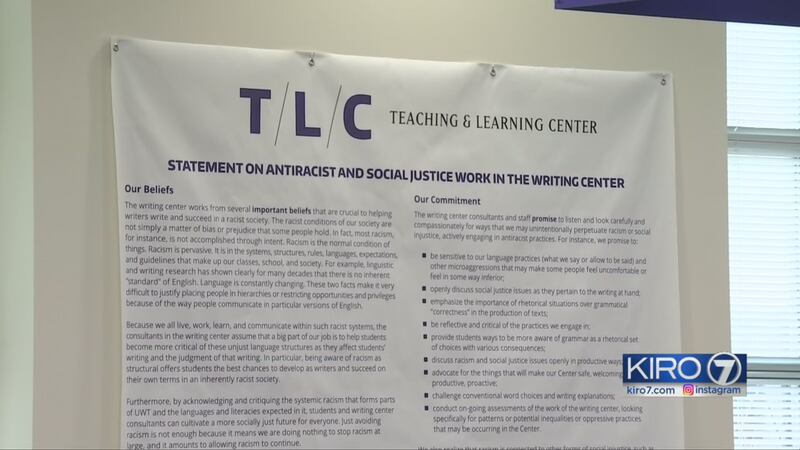What was meant as a move to reduce racism in writing at the University of Washington Tacoma has sparked an online backlash from right-wing media, claiming the school has pronounced proper grammar racist.
The statement, titled, "Putting Writing at the Center of Inclusivity," is posted online and on the wall at UWT's writing center. Central to its theme are sentences such as, "there is no inherent 'standard' of English."
The goal, according to a post by Writing Center Director Dr. Asao Inoue, is “to ensure that through compassion and careful consideration, staff do not inadvertently embrace racist practices."
"[We] tried to offer a way that we could be inclusive and welcoming and helpful to everyone who comes, no matter where in the work, or where in the community they come from," said Inoue.
But several right-leaning news outlets have interpreted it another way.
Website headlines claim the school has “declared proper grammar racist," and “declared American grammar a racist and unjust language structure."
Breitbart, a website once called a platform for the alt-right by former head Steven Bannon, who is now chief strategist for President Donald Trump, wrote that the statement claims “pressure to conform to proper American grammar standards perpetuate systems of racism."
That claim is not included in the center's statement.
“Some of the criticism is that we’re not teaching a standard, a conventional standard,” Inoue said. “That’s not true, I mean it really isn’t true.”
The statement was a collaborative effort between university staff and students and took more than a year to draft according to Inoue. It was posted online and in the UWT’s Writing Center in October.
Senior Laurel Jimenez has seen the online articles critical of the writing statement, and said they “cherry picked” phrases from the statement and mischaracterized their meanings.
“I did see a lot of anger,” said Jimenez. “A lot of people saying, 'If you don’t like speaking English, then you should leave.' But that’s not what anyone is trying to say.”
You can read the Writing Center Statement by clicking this link.
<strong>Kevin McCarty has a full report on KIRO 7 News starting at 5 p.m. <a href="http://www.kiro7.com/live-stream" target="_blank">Watch on-air or at this link.</a></strong>
Here’s the full statement.
Our Beliefs
The writing center works from several important beliefs that are crucial to helping writers write and succeed in a racist society. The racist conditions of our society are not simply a matter of bias or prejudice that some people hold. In fact, most racism, for instance, is not accomplished through intent. Racism is the normal condition of things. Racism is pervasive. It is in the systems, structures, rules, languages, expectations, and guidelines that make up our classes, school, and society. For example, linguistic and writing research has shown clearly for many decades that there is no inherent “standard” of English. Language is constantly changing. These two facts make it very difficult to justify placing people in hierarchies or restricting opportunities and privileges because of the way people communicate in particular versions of English.
Because we all live, work, learn, and communicate within such racist systems, the consultants in the writing center assume that a big part of our job is to help students become more critical of these unjust language structures as they affect students' writing and the judgment of that writing. In particular, being aware of racism as structural offers students the best chances to develop as writers and succeed on their own terms in an inherently racist society.
Furthermore, by acknowledging and critiquing the systemic racism that forms parts of UWT and the languages and literacies expected in it, students and writing center consultants can cultivate a more socially just future for everyone. Just avoiding racism is not enough because it means we are doing nothing to stop racism at large, and it amounts to allowing racism to continue.
Our Commitment
The writing center consultants and staff promise to listen and look carefully and compassionately for ways that we may unintentionally perpetuate racism or social injustice, actively engaging in antiracist practices. For instance, we promise to:
- be sensitive to our language practices (what we say or allow to be said) and other microaggressions that may make some people feel uncomfortable or feel in some way inferior;
- openly discuss social justice issues as they pertain to the writing at hand;
- emphasize the importance of rhetorical situations over grammatical “correctness” in the production of texts;
- be reflective and critical of the practices we engage in;
- provide students ways to be more aware of grammar as a rhetorical set of choices with various consequences;
- discuss racism and social justice issues openly in productive ways;
- advocate for the things that will make our Center safe, welcoming, productive, proactive;
- challenge conventional word choices and writing explanations;
- conduct on-going assessments of the work of the writing center, looking specifically for patterns or potential inequalities or oppressive practices that may be occurring in the Center.
We also realize that racism is connected to other forms of social injustice, such as classism, sexism, heteronormative assumptions, etc., in similar ways. We promise further to do our best to compassionately address these issues as they pertain to student writing as well.
Cox Media Group







